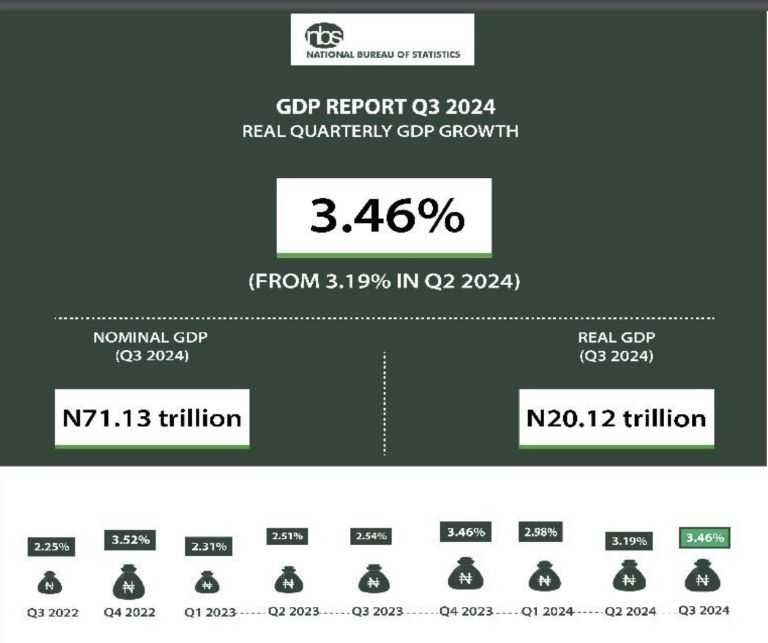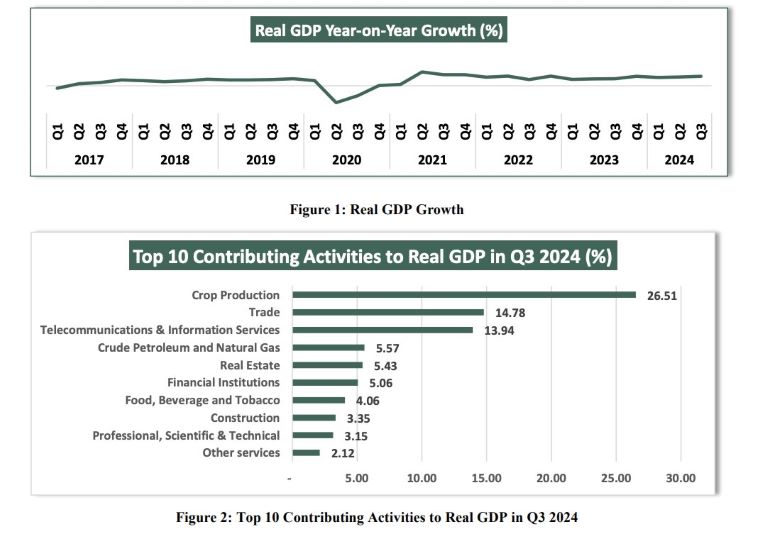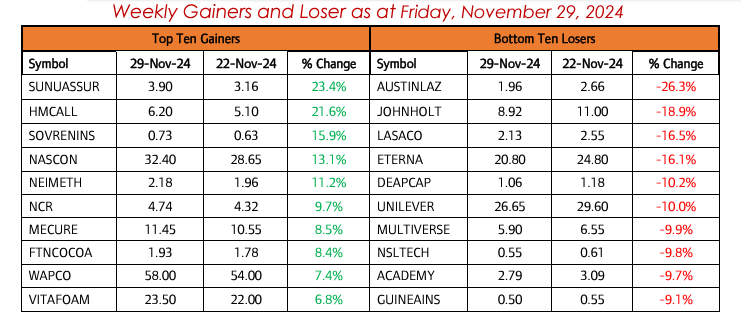This week’s economic report shows key economic developments across various regions. Germany’s inflation held steady, while Kenya’s rose, primarily due to higher food prices. Nigeria’s GDP grew, driven by both oil and non-oil sectors. The CBN raised the borrowing rate to 27.50% to combat inflation, while the stock market experienced a slight decline. Read for updates on the week’s key economic indicators for Nigeria and selected others.
Germany’s annual inflation stabilized at 2.40%, with core inflation rising slightly to 3.00%. Energy prices fell by 3.70%, while food prices increased by 1.80%. The European Central Bank (ECB) is likely to consider these trends when making future monetary policy decisions.
In Kenya, inflation rose to 2.80%, up from 2.70% in October, mainly driven by higher food prices. The month-on-month inflation rate increased to 0.30%. Despite these changes, inflation remains within Kenya’s target range of 2.50% to 7.50%. We expect this to continue in the near term, barring any agricultural disruptions or significant changes in global prices.
Nigeria’s Economy
Nigeria’s GDP grew by 3.46% YoY in Q3:2024, driven by expansions in both oil and non-oil sectors. The oil sector saw a 5.17% YoY growth, supported by increased crude oil production. The non-oil sector expanded by 3.37% YoY, primarily driven by the financial services sector.

Economic performance is expected to remain subdued, with potential for sustained recovery depending on factors like improved oil output and favourable fiscal measures. However, persistent inflation, the weakening of the Naira, and high borrowing costs could limit growth prospects.
The Port Harcourt Refinery has resumed operations, boosting local refining capacity and contributing to better energy security. However, the sustainability of these operations depends on consistent maintenance, technical upgrades, and further infrastructure investment in the sector.
Monetary Policy
The Monetary Policy Committee (MPC) of the Central Bank of Nigeria (CBN) has increased the Monetary Policy Rate (MPR) by 0.25% to a record high of 27.50%. This decision is aimed at managing inflation while considering the country’s economic situation for 2025. Nigeria is facing rising inflation, with the overall rate hitting 33.88% in October, the highest in four months. Food prices are particularly affected, with food inflation at 39.2%, and core inflation reaching an all-time high of 28.4%.

The MPC noted that inflation has multiple causes, negatively affecting household incomes and well-being. Increasing energy prices, especially for Premium Motor Spirit (PMS), are driving up production and distribution costs, which puts pressure on both businesses and consumers. The committee praised the government’s efforts to improve security in the Northeast and expressed hope that fully deregulating the petroleum sector will help stabilize energy prices and ease supply issues in the future.
The CBN also kept the Cash Reserve Ratio at 50% and the Liquidity Ratio at 30%, which helps maintain higher returns in the fixed-income market, though it has a limited effect on the stock market.
Starting December 2, 2024, the CBN now require the use of the Bloomberg B-Match platform for interbank foreign exchange (FX) trading. This platform makes trading more efficient and transparent by automating trade matching and providing better oversight. While there may be short-term challenges during this transition, it is expected to bring long-term benefits.
Money Market
The fixed-income market experienced a bearish trend this week, with average bond and treasury bill yields slightly rising to 19.46% and 24.80%, respectively. Increased market activity was observed at the bond curve, with notable sell-offs in maturing instruments in May, June, and February 2034.
The Eurobond market experienced a bullish rebound after two weeks of bearish performance, with an average yield of 9.66%. This is due to increased investor confidence in emerging markets amid global rate cuts and the anticipation of the upcoming Federal Reserve meeting, which is expected to result in a rate cut.
Stock Market
The Nigerian stock market closed negative in November, with the NGX All-Share Index declining by 0.33% week-on-week. This downturn was driven by reactions to newly published macroeconomic data and cautious interpretations of Nigeria’s evolving economic narrative.
The third-quarter GDP report revealed a year-on-year growth of 3.46%, driven by the vibrancy of the services and agriculture sectors. The oil sector experienced modest gains, reflecting a slight increase in output.

The MPC’s decision to raise the MPM by 25 basis points was an attempt to temper inflation. Investor sentiment remained cautious as market capitalisation dipped southward, shrinking by ₦184.73 billion to settle at ₦59.11 trillion. Year-to-date, the NGX All-Share Index has returned 30.40%, with market capitalisation gaining 44.5% over the same period.
Trading activity presented a mixed picture, with weekly traded volume surging by 63.6% and the value of trades increasing by 52.9% to ₦54.85 billion. Sectoral performance painted a varied landscape, with the NGX Oil & Gas index dropping by 1.93% and the NGX Consumer Goods and Banking indices dropping by 0.38% and 0.28%, respectively.
The local bourse ended the week negatively, with the NGXASI dropping 0.34% YoW, settling at 97,624.82pts. ETERNA, GTCO, and UNILEVER profit-taking activities subdued buying interest on NASCON, MECURE, WAPCO, and OANDO. Across sectors, NGXINS, NGXINDUSTR, and MERI-AGRIC closed positive, while NGXBNK, NGXOILGAS, NGXCNSMRGDS, and MERI-TELCO indices closed in the red zone.
The week’s top gainers were SUNUASSUR, SOVRENINS, NASCON, NEIMETH, and NCR, while the top losers were AUSTINLAZ, JOHNHOLT, LASACO, ETERNA, and DEAPCAP. FBNH topped both the volume and value charts.
Conclusion
The CBN raised the policy rate by 875 basis points from 18.75% to 27.50% in 2024, a 25-basis-point hike. This is to manage inflation, spur economic growth, maintain price stability, and encourage domestic savings.
The decision is expected to continue into early 2025, but as inflation shows signs of moderation, a more accommodative approach may be adopted. The current approach signals cautious optimism as the CBN navigates inflation control, economic growth, and monetary transmission.
As the year draws to a close, investors are expected to face mixed sentiment, with the possibility of a Santa rally. However, the technical picture remains uncertain, with a failed bullish hammer candlestick indicating market weakness and momentum indicators suggesting a recovery despite persistent selling pressure.
As the market enters the final month of 2024, rising inflation, monetary policy adjustments, and seasonal trends will shape its path.
Comment, Like 👍, share this article, and Follow us on our social media handles.








